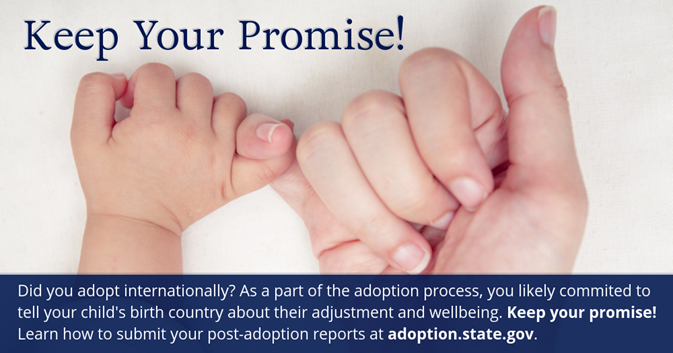The Office of Children’s Issues at the U.S. Department of State has declared May 15
th Post-Adoption Report Day.
It’s an opportunity to highlight the importance that parents who have
adopted through intercountry adoption keep their promises and submit
post-adoption reports as they committed to during the adoption process.
Here are 3 simple reasons NCFA believes Post-Adoption Reporting matters!
- You promised!
As a part of the adoption
process, you were entrusted with the care of your child and promised to
share about their future experiences. While it is easy to forget about
extra paperwork in the important work of caring for your children, we
think keeping your promise to report back on the wellbeing of your child
is critically important.
- It’s a great opportunity for reflection.
Post-adoption
reports are a good time to do some reflection and assessment. Consider
your reporting dates an opportunity, not an obligation. You can review
and celebrate progress and milestones. Take a moment to consider what
types of support might help your child (and you!) to grow and thrive.
And consider what your goals are for your child and your family between
now and the next reporting date. It’s also a terrific time to touch base
with your adoption agency or other adoption professionals if you need
any support. For some countries, you’re required to connect with your
agency at this time anyway. It’s a natural and convenient time to touch
base about any questions, concerns, or supports your family might find
valuable.
- You’re helping to support future adoptions.
Post-adoption
reports are one of the ways countries assess whether children are
healthy, safe, and loved as a result of intercountry adoption. This
information can be critical to deciding whether future children will
have the option to join families through intercountry adoption or might
otherwise languish in institutions or other impermanent situations.
So, what exactly is a post-adoption report? While the number and
timing of reports required varies, generally the report’s goal is to
discuss the child’s development and adjustment to a new family, home,
and country. It’s important to pay special attention to the specific
requirements in the country a child is adopted from. The type of
information, how it should be assessed (through an agency or by parents
themselves), and how it should be submitted can vary widely from country
to country. Below, we’ve listed some basic information on several
countries reporting requirements. If you have specific questions about
what your reporting requirements are, we encourage you to reach out to
your adoption service provider to learn more. Department of State also
provides
country specific information and can be contacted if you need more information.
Post-Adoption Report Requirements
We aren’t listing in detail all the country requirements, but wanted
to give examples of some common countries of origin and their general
guidelines, we’ve also linked through to more specific information at
Department of State for each country. Of course, the best way to get
information on what is required for your adoption is always to contact
your adoption service provider and confirm what was required by the
country at the time of your adoption and any other requirements the
agency might have that you agreed to during the adoption process.
Bulgaria: 4 reports required. One every six months after adoption for first two years.
China:
6 reports required. Six months after adoption and at 1,2,3,4, and 5
years after adoption. First 3 reports must be prepared by the social
workers who prepared the homestudy. Families may write last three
reports themselves.
Colombia:
4 reports—signed by social worker—at 6, 12, 18, and 24 months from the
date of the final court decree which is signed while the family is in
Colombia.
Ethiopia:
Post-adoption reports are required at 3, 6, and 12 months
post-adoption. After the first year, reports must be filed yearly until
child turns 18.
Haiti:
7 post-adoption reports are typically required. The first 4 must be
completed with the adoption service provider at 6, 12, 18, and 24 months
after adoption. The last 3 reports at moths 36, 48, and 60 may be
submitted directly to IBESR by adoptive parents.
India: Post-adoption reports are required quarterly in the first year after adoption, and twice a year during the 2
nd year. They may be submitted online by the adoption service provider.
Kazakhstan:
Post-adoption reports are required every six months for the first 3
years, and once a year until the child is 18. Reports are to be
submitted to Kazakhstani diplomatic mission in the country of the
child’s residence.
Philippines:
During the first 6 months of custody the adoption service provider must
conduct bi-monthly reports. After this period, adoptive parents should
file a petition for adoption in U.S. court.
Russia:
Russia requires children to be registered with the Russian Ministry of
Foreign Affairs before they leave Russia or with the Russian Embassy or
Consulate upon arrive in the U.S. 4 post-adoption reports are required.
The reports should be completed: (1) 5 months after adoption court order
and submitted no later than the end of the 7
th month, (2) 11 months after adoption court order and no later than then end of the 13
th month, (3) 23 months after adoption court order and submitted no later than the end of the 25
th month, and (4) 35 months after adoption court order and no later than then end of the 37
th month.
Ukraine: Post-adoption reports are required annually for the first 3 years, and once every 3 years thereafter until the child is 18.


